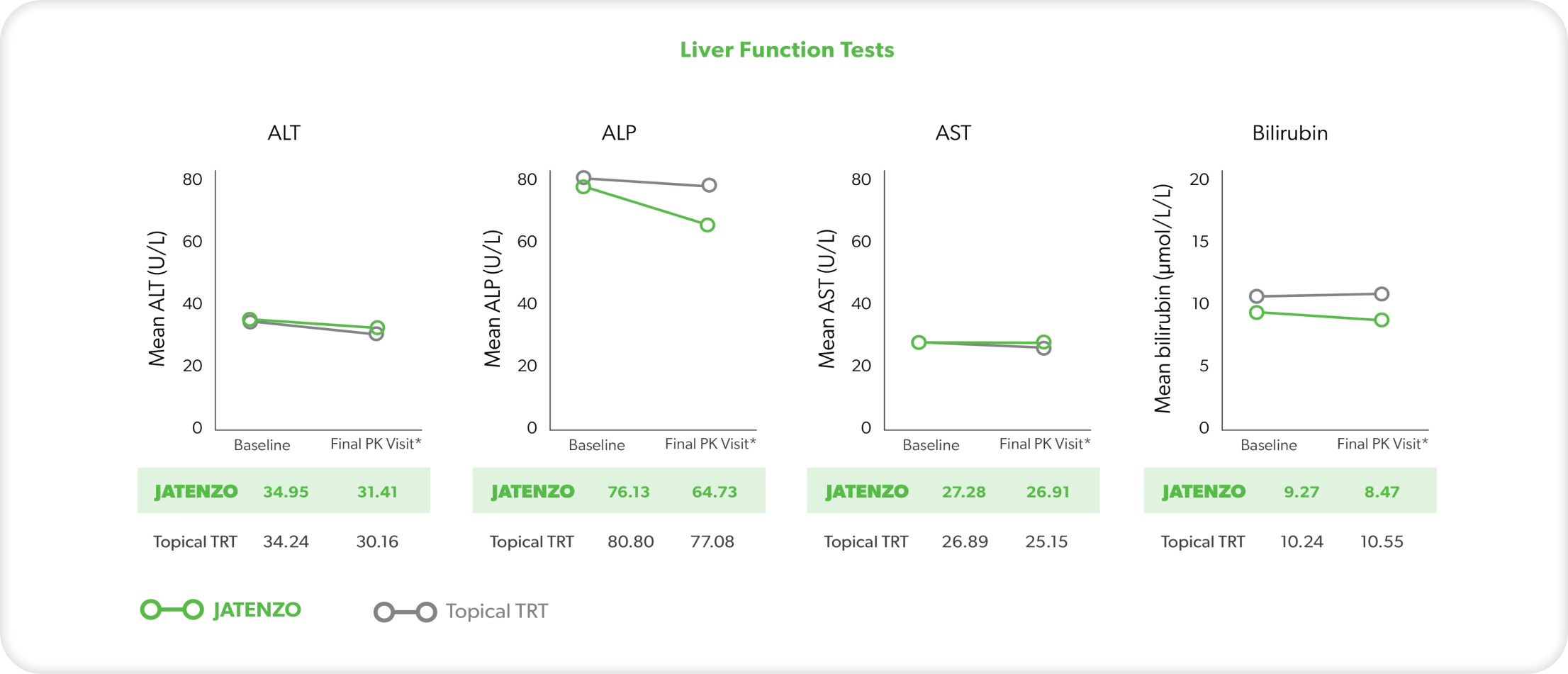Have a JATENZO question?
Connect with an account manager for support, or request medical information about JATENZO clinical trials and safety.

ADVERSE EVENTS
Three patients (1.8% of 166) had adverse reactions that led to premature discontinuation from the study, including rash (n=1) and headache (n=2).1
Adverse reactions reported in >2% of patients in all Phase 2 and Phase 3 JATENZO trials combined (N=569): Polycythemia, diarrhea, dyspepsia, eructation, peripheral edema, nausea, increased hematocrit, headache, prostatomegaly, and hypertension.1
| OVERALL (N=166) |
|
|---|---|
| Headache | 8 (4.8%) |
| Hematocrit increased | 8 (4.8%) |
| Hypertension | 6 (3.6%) |
| High-density lipoprotein decreased | 5 (3.0%) |
| Nausea | 4 (2.4%) |
Hematocrit levels increased but stayed within normal range for 97% of men2
LIVER FUNCTION


No changes in liver function
No clinically significant changes in liver function tests were observed.
Topical TRT study design2,6
In the inTUne trial, subjects who met all eligibility criteria were randomly assigned in a 3:1 ratio to JATENZO (n=166) or topical TRT (n=56) for 3 to 4 months. The starting dose for topical TRT was 60 mg once daily (QD) in the AM. Doses were adjusted on Days 21 and 56 (minimum 30 mg QD; maximum 120 mg QD) based on average T concentration obtained over 24 hours post morning dose. Beyond the primary objective of the inTUne study, other objectives included comparing JATENZO-treated subjects with topical TRT-treated subjects in terms of Cavg DHT concentration at Visit 7.
Adverse reactions occurring in >2% of subjects in the topical TRT arm2:
Headache=1 (1.8); hematocrit increased=0; upper respiratory tract infection=0; hypertension=0; high-density lipoprotein decreased=0; nausea=0; rash=2 (3.6); overdose=2 (3.6).
Additional details:
Two oral TU patients experienced increases in AST or ALT that were <2x the ULN and 1 oral TU patient experienced an elevation of AST (<2x ULN) that returned to normal during continued oral TU treatment.2
*Final visit was defined as either Visit 7 or date of last data collection if terminated early.6
ALT=alanine aminotransferase; ALP=alkaline phosphatase; AST=aspartate aminotransferase; DHT=dihydrotestosterone; QD=once daily; ULN=upper limit of normal.
Connect with an account manager for support, or request medical information about JATENZO clinical trials and safety.
JATENZO®(testosterone undecanoate) capsules, CIII, is an androgen indicated for testosterone replacement therapy in adult males for conditions associated with a deficiency or absence of endogenous testosterone:
Safety and efficacy of JATENZO in males less than 18 years old have not been established.
JATENZO is contraindicated in men with carcinoma of the breast or known or suspected carcinoma of the prostate, in women who are pregnant, in men with a known hypersensitivity to JATENZO or its ingredients, or in men with hypogonadal conditions that are not associated with structural or genetic etiologies.
Increase blood pressure and Major Adverse Cardiovascular Events. JATENZO can increase blood pressure, which can increase the risk of MACE, with greater risk in patients with established cardiovascular disease or risk factors for cardiovascular disease.
Increase in hematocrit and polycythemia. High red blood cell counts increase the risk of clots, strokes, and heart attacks.
Benign prostatic hyperplasia (BPH). Patients may see worsening signs and symptoms of BPH.
Prostate cancer. Patients treated with androgens may be at increased risk for prostate cancer.
Venous thromboembolic events (VTE). Deep vein thrombosis (DVT) and pulmonary embolism (PE) have been reported in patients using testosterone replacement products like JATENZO.
Abuse. Testosterone has been subject to abuse, typically at doses higher than recommended for the approved indication and in combination with other anabolic androgenic steroids. Testosterone abuse can lead to serious cardiovascular and psychiatric adverse reactions.
Suppression of spermatogenesis. Large doses of androgens, like JATENZO, can suppress spermatogenesis.
Hepatic adverse events. JATENZO is not known to cause liver adverse events; however, patients should be instructed to report any signs of hepatic dysfunction.
Retention of sodium and water.
Gynecomastia.
Sleep apnea. Testosterone may potentiate sleep apnea in some patients, especially those with risk factors such as obesity or chronic lung disease.
Changes in the serum lipid profile may require dose adjustment of lipid-lowering drugs or discontinuation of testosterone therapy.
Risk of hypercalcemia.
The most common adverse events of JATENZO (incidence ≥2%) are headache (5%), increased hematocrit (5%), hypertension (4%), decreased HDL (3%), and nausea (2%).
JATENZO can cause changes in insulin sensitivity or glycemic control and changes in anticoagulant activity. Use of testosterone and corticosteroids concurrently may increase fluid retention. Use of prescription and nonprescription analgesic cold medications with JATENZO have been known to increase blood pressure.
Please see full Prescribing Information, including BOXED WARNING on increases in blood pressure.
To report suspected adverse reactions contact Tolmar at 1-844-4TOLMAR (486-5627) or the FDA at 1-800-FDA-1088 or visit www.fda.gov/medwatch.
References
1. JATENZO® [prescribing information]. Fort Collins, CO: Tolmar; 2023.
2. Swerdloff RS, Wang C, White WB, et al. A new oral testosterone undecanoate formulation restores testosterone to normal concentrations in hypogonadal men. J Clin Endocrinol Metab. 2020;105(8):2515-2531.
3. Swerdloff RS, Dudley RE. A new oral testosterone undecanoate therapy comes of age for the treatment of hypogonadal men. Ther Adv Urol. 2020;12:1-16.
4. Data on file. The Landmark SERMO survey: The state of TRT in 2024. (conducted February 16-March 1, 2024). Tolmar, Inc.
5. Data on file. The Harris Poll. Hypogonadism Patient Research: Executive Summary (conducted May 6-June 5, 2020). Tolmar, Inc.
6. Data on file. Clinical Study Report: CLAR-15012. Tolmar, Inc.
7. Petrova TV, Koh GY. Organ-specific lymphatic vasculature: From development to pathophysiology. J Exp Med. 2018;215(1):35-49.
8. Data on file. Clinical Study Report: CLAR-09009. Tolmar, Inc.
9. Data on file. Clinical Study Report: CLAR-09007. Tolmar, Inc.
10. Shoskes JJ, Wilson MK, Spinner ML. Pharmacology of testosterone replacement therapy preparations. Transl Androl Urol. 2016;5(6):834-843.